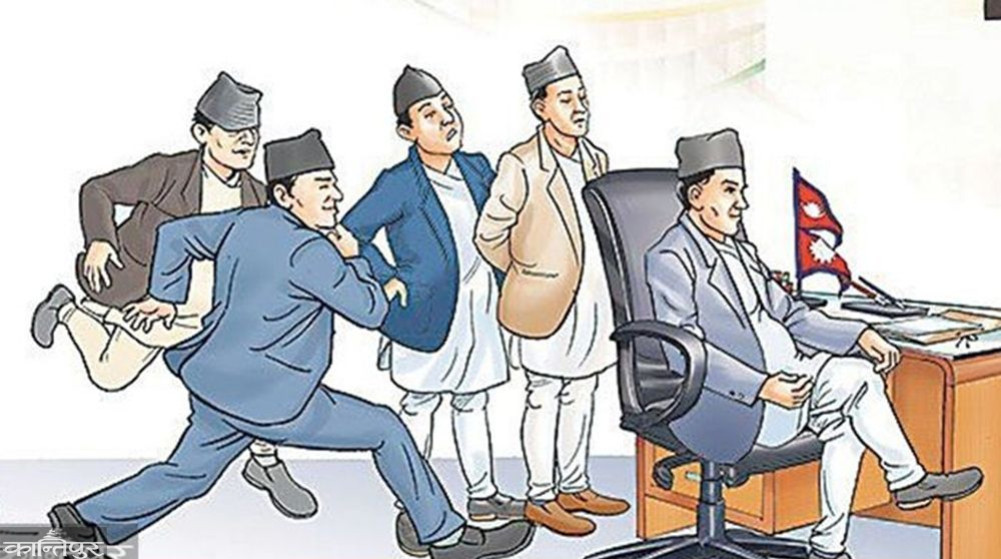Very slow corridor work
We use Google Cloud Translation Services. Google requires we provide the following disclaimer relating to use of this service:
This service may contain translations powered by Google. Google disclaims all warranties related to the translations, expressed or implied, including any warranties of accuracy, reliability, and any implied warranties of merchantability, fitness for a particular purpose, and noninfringement.


The dream of 56-year-old Gyalchen Gurung from Dolpobuddha rural municipality-6 in Dolpa is not yet complete. Since there were no road facilities, he was carrying goods on his back from Tibet since he was seven years old.



But after the closure of the Chinese border due to Corona, it is difficult for him to get food and daily consumables. "We used to walk to the Chinese border in one day," he said. He said that his sons and grandsons will be happy if the road to China is opened. 40-year-old Phonjuk Lama Gurung of Charkatangsong-1 has also been suffering for years due to lack of roads.
The work on the Very Corridor, which was started to connect India, Nepal and China with a road network, has slowed down. Due to the negligence of the contractor, the construction of the road above the Dolpa headquarter Dunai has not been able to speed up, due to which the trade relations between the three countries have not been established and the locals are forced to travel to the headquarter Dunai after a five-day walk. In the absence of a road network, the residents of Chharkatang, Dolpobuddha and She-Foksundo Rural Municipality of Upper Dolpa had to rely on horses and carts to transport food and daily consumables. After the opening of the northern border, not only Karnali, but the whole country can benefit, according to the President of She-Foksundo Rural Municipality, Turasunduk Gurung. "After the opening of the road, the trade with the north will increase," he said, "as the locals will also get jobs, it will help reduce poverty." , due to which the locals are dependent on food from outside. The main occupations of the locals are herb gathering and animal husbandry. But since the road is not connected to China, the business of locally collected herbs such as Yarchagumbu, Guchichau, Katuki and local products has not been directly connected to the Chinese market.
Under Bheri Corridor, Jajarkot-Dolpa road of 217 km to Dolpa headquarter Dunai was connected about 5 and a half years ago. But beyond that, there is a distance of about 100 kilometers from China border to Dho and Marim, of which the work is divided into three sections, but the work of two sections is incomplete, according to Sunil Ranjitkar, divisional engineer of the Bheri Corridor Planning Office.
The distance from Dolpa headquarter Dunai to Lasicap is 25 km. To open the track, the Surya-Shreya-Shanti Devi JV construction company was entrusted with the construction of the road at a cost of Rs. The period for opening the track of the road is four years. However, till now only 6 km road has been dug till Byasgad. "The contractor did not work for almost two and a half years, after the project office was opened, the contractor started the work," he said, "It is difficult to open the track within the next year and a half because of the hard rocks."
This road section has at least 15 hard rock formations ranging from 100 meters to 1 km. Ranjitkar said, "There is no alternative to using explosives to break those mounds, but it is difficult to get explosives, which will delay the construction of the road." Currently, three machines (excavators) are working in this section. The road construction work has been completed in 40 km from Lasikap to Marim Dho section. After the local levels have completed the road construction work, now Charkatangsong Rural Municipality of Dolpa is connected to the road network with Mustang. However, due to the lack of upgrading of the road, it is difficult to drive for about 6 months during monsoon and snowfall.
Under the third section, the 35 km track from Marim to the China border is yet to be opened, said Engineer Mahendra Majhi of the Planning Office. "After the road reached Sadarmukam Dunai, there was confusion for almost a year whether to hand it over to the army again or to build it by the road department, later the contract was opened through the Chaurjahari road division," he said, "but the road construction work was stopped for a long time because the road division did not regularly monitor and regulate the project. After the opening of the office, the work is gaining momentum. The planning office has prepared a tender call for the section up to the China border.
Due to the delay in the construction of the road, even the tourists who go to see She-Foksundo Lake are forced to suffer. The road construction work has been started to connect Jamunah (Nepalganj) border of Lumbini province through Karnali province. If this corridor is built, the road network will be extended from India's Rupadiya to China's Tibet. As there is no road in Upper Dolpa, the residents of Charkatangsong, Dolpobuddha and She-Foksundo Rural Municipality are still forced to spend their daily lives on horses and carts. There is a compulsion to consume daily consumable goods, food and construction materials from the headquarters Dunai by paying up to 100 rupees per kg on horses, khachchad.
075 Travel is also miserable on the Jajarkot-Dunai road under the Bheri Corridor, where the Nepali Army opened the road track on 4th November. Even though the distance from Nepalgunj to Dunai is 272 km, at least 6 vehicles need to be changed to cross this road and the fare is about 5 thousand rupees. Bishnu Budha of Dunai said that when reaching Dunai from Nepalgunj, it is a painful journey of at least 24 hours. "We have to wait for the time when the accident will happen. We have to change up to 6 vehicles on the road because there is no bridge in between," he said.
In the rainy season, the first train from Jajarkot Khalanga to Chalgad, from there after crossing the Chugad river for 500 meters, the second train to Damachur, the third train from Damachur to Multara in Rukum West and the fourth train from Multara to Tallu by crossing the suspension bridge of the river Bheri on the Rukum-Jazarkot border. Prem Bahadur Budha said. After getting on the fifth car from Choukha, Tatargad and the sixth car, you will reach both.
Passengers have been suffering because the bridge being constructed at Tallu Bagar to connect Jajarkot and Rukum has not been completed. Tallu's belay bridge, which was in the final stage of construction, collapsed on May 7 and two workers lost their lives. Chief District Officer Tulsi Prasad Dahal said that the construction of the bridge was delayed due to a dispute over compensation. "After the settlement of the compensation dispute, there was a shortage of construction materials," he said.
At present, Yeti Builders is working on a contract for road upgradation (black paper) from Bheri Municipality-4 Pasagad in Jajarkot to Tallu in Nalgad Municipality-12. But the local leader Mahendra Malla said that due to the delay in the work, they have to travel at risk. Another 15 bridges are yet to be constructed over various rivers under the road section. Karna Bahadur Hamal, a businessman from Dunai, said that due to the lack of upgrading of the road, he was forced to make a difficult journey. 'For us, the car has come,' he said, 'We must always trust in God.' He said that he could not.
 प्रकाशित : जेष्ठ ९, २०८१ ०७:२६
प्रकाशित : जेष्ठ ९, २०८१ ०७:२६

 २१.१२°C काठमाडौं
२१.१२°C काठमाडौं
















